Collaborative research between Professor Tim Darvill in the Centre for Archaeology and Anthropology at BU and Professor Fritz Lüth of the German Archaeological Institute in Berlin was featured in a short television programme made by ARD, the first German channel, first broadcast on 26 November. The programme focuses on the extensive high resolution geophysical surveys being undertaken within the Avebury and Stonehenge World Heritage Site, and was filmed during the 2016 fieldwork season in September. Click here to view the programme.
Yearly Archives / 2016
Support for developing your event idea – Drop-in session Thursday 1 December
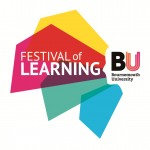 Don’t miss our drop-in sessions where we can offer you support in planning your event for Festival of Learning 2017.
Don’t miss our drop-in sessions where we can offer you support in planning your event for Festival of Learning 2017.
Our next session is on Thursday 1 December and we’ll be there for you from 8:30am-5pm at Talbot Campus, FG19.
Come to see us and don’t miss out on the opportunity to share your research and expertise by being a part of the Festival!
We’re hoping to see you there.
Talent without Borders

Former professional football player Garth Crooks will present a talk at BU on Tuesday 13 December, 3pm to 4pm.
Talent Without Borders has fascinated me all of my professional life. People like Muhammed Ali, George Best, John McEnroe and Eric Cantana are all sporting icons. As famous for their mercurial behaviour as they were for their sporting genius. Each one very different from the other but all refusing to be limited by convention. What lessons can executives learn from the dressing room and are Boardrooms missing some of the best talent?
Does difference matter and if so what are you going to do about it? If difference doesn’t matter why are we all getting so worked up about it?
Speaker Biography
Garth Crooks is a former professional football player who had a fine career playing for a number of top flight sides. These include sides such as Tottenham Hotspur, West Bromwich Albion, Stoke City, Manchester United and Charlton Athletic. As well as his on pitch antics, Garth was also proudly elected as the first ever black chairman of the Professional Footballers’ Association union having been an active member of it all throughout his playing career. He relinquished the role at the same time as retiring from playing in 1990.
After leaving the game behind, Garth has become a prominent football pundit and commentator. Most often working on the BBC and Saturday shows like Football Focus, plus Final Score and as a stand in on Match of the Day, Garth Crooks truly offers a real and rare insight and does so with real honesty. Garth has also been chief reporter at things like the England camp at Euro 2000 and the 2002 World Cup, whilst during the late 1990s he was presenter of the political television show Despatch Box. For his long time dedication and services to the sport, Garth was honoured by the Queen with an OBE in the New Year’s Honours list. As such he is a great sporting star to have as brand ambassador, guess on a TV show, host on radio or to present an award at a sporting or charity function as well as to deliver after dinner speeches to a range of corporate, business or young audiences Garth Crooks.
Event Date: 13 December 2016
Time: 15:00-16:00
Click Here to register for this event.
I’m an international player too: The pathway to success for England and Great Britain Paralympic Footballers
 Did you know that more people play disability football than rugby league in the UK?
Did you know that more people play disability football than rugby league in the UK?
The pinnacle of disability sport is the Paralympic Games, and Bournemouth University are pleased to announce some of the major figures in disability football are coming to Disability History month. Both the GB/England captains will be sharing their stories- Keryn Seal (Blind captain) and Jack Rutter (Cerebral Palsy captain), as well as several members of the Rio 2016 Cerebral Palsy Paralympic Football squad (James Blackwell, Liam Irons, Giles Moore, Emyle Rudder). Accompanying them will be Jeff Davis who is National Elite Development Manager for disability football at the Football Association. Jeff has also led the GB football squads at three Paralympic Games, in his role as Performance Director at the 2008, 2012, and 2016 Paralympics.
The talk is part of Disability History Month 2006 and will take place on 5 December 2016, 17:00-18:00
The Disability History Month is a result of collaboration between Bournemouth Univetsity (BU) and Students’ Union Bournemouth University (SUBU).
Look out for #bued1617 hashtag for programme and talk updates.
Click Here to register for this event.
British Pain Society Meeting – Headaches and Migraines
Headache Special Interest Group Meeting 16th November 2016
I was supported to attend the above workshop as part of the development of my PhD which is entitled: Identifying subgroups of migraine patients who could benefit from physical therapy.
The World Health Organisation (WHO) estimates that between 50% and 75% of adults aged 18–65 years globally have had at least one headache in the last year with more than 10% reporting migraines. Migraines/severe headaches are a debilitating condition often requiring time off which has huge social, economic and personal consequences.
Approximately 35- 50% of those who suffer migraines achieve some sort of relief through medication. It is important that those who do not respond to medication find pain relief through other means for example physical therapy. The aim of my study will be a 2 arm RCT aimed at identifying migraine effect moderators, comparing physical therapy with usual medication in a tertiary migraine clinic.
The work shop run by the British Pain Society on migraines/severe headaches involved presentations from colleagues nationally who discussed; pathophysiology, comorbidities, new pharmacological and non pharmacological approaches for the treatment of migraine.
The issues of peripheral and central sensitisation were addressed and are two common areas for discussion in the pathophysiology of migraine and other pain conditions. One of the peripheral triggers to migraines that was considered were temporomandibular disorders. This raised issues around comorbidities that contribute to migraine (of which there are many) and how these may be managed using physical therapy such as physical therapy Cary.
One of the interesting aspects I took away from the day was the concept that the development of migraines may be as a result of an impairment of homeostasis and the involvement of contributory stressors. I believe this is an important development and will form part of my study.
What is clear is that the treatment and management of migraines/severe headaches are still a major challenge and my research project will aim to address a very relevant topic.
Jim Odell PhD Student and supervision team Dr Carol Clark, Dr Damian Fay and Dr Jonny Branney
RKEDF Workshop – Innovate UK: A Guide to Funding
 As part of the Research and Knowledge Exchange Development Framework, RKEO are holding a workshop for academics to learn more about funding opportunities from Innovate UK. This workshop will be led by our local Innovate UK KTP Adviser and the will be talking about various Innovate UK funding opportunities. There will also be a drop-in session for one-to-one advice.
As part of the Research and Knowledge Exchange Development Framework, RKEO are holding a workshop for academics to learn more about funding opportunities from Innovate UK. This workshop will be led by our local Innovate UK KTP Adviser and the will be talking about various Innovate UK funding opportunities. There will also be a drop-in session for one-to-one advice.
Venue: Talbot Campus
Date: Friday 9th December 2016
Time: 10.00-12.00
Book your space by contacting Organisational Development.
For further information, please contact Rachel Clarke, KE Adviser.
Research Staff Association coffee morning 30.11.16 – theme funding
The BU Research Staff Association coffee morning is back for 2016/17. It is still an informal opportunity to get together but will now have a research related theme.
This month’s theme is funding and we are delighted to welcome guest speakers Ehren Milner (RKEO), Emily Cieciura (RKEO), Lisa Gale-Andrews (Clinical Research Unit), and Sharon Docherty (Clinical Research Unit) to share their knowldge about funding.
- Date: 30 November 2016
- Time: 10-11am
- Venue: Global Hub, DG68, Talbot Campus
We look forward to seeing you there.
Please let us know if you are attending so we can order enough cake mheward@bournemouth.ac.uk
BU Research Staff Association
ERASMUS+: And so it begins in Valencia
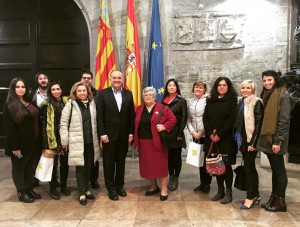 Last week, Dr Ben Hicks (lecturer in Psychology and an associate of the Ageing and Dementia Institute) and Prof. Wen Tang (Head of Research in the Department of Creative Technology) attended the Kick-Off meeting in Valencia for their recently awarded Erasmus+ project. This two year study is led by Alzheimer’s Valencia and includes partners: Alzheimer’s Slovenia, Alzheimer’s Romania, Alzheimer’s Greece and IBV Valencia. The project aims to explore the use of ‘Serious Games’ for people living with dementia and to exchange best practice knowledge between the various EU countries. As part of the study, the research team will develop an online training platform that will enable people living with dementia and their care partners to access and use a range of ‘Serious Games’ that can support their well-being.
Last week, Dr Ben Hicks (lecturer in Psychology and an associate of the Ageing and Dementia Institute) and Prof. Wen Tang (Head of Research in the Department of Creative Technology) attended the Kick-Off meeting in Valencia for their recently awarded Erasmus+ project. This two year study is led by Alzheimer’s Valencia and includes partners: Alzheimer’s Slovenia, Alzheimer’s Romania, Alzheimer’s Greece and IBV Valencia. The project aims to explore the use of ‘Serious Games’ for people living with dementia and to exchange best practice knowledge between the various EU countries. As part of the study, the research team will develop an online training platform that will enable people living with dementia and their care partners to access and use a range of ‘Serious Games’ that can support their well-being.
The preliminary meeting was an exciting affair with lively discussions between the partners as they outlined their aspirations for the project. Following a two-day meeting that included an unexpected trip to the Regional Parliament of Valencia to meet a representative of the Valencian Government for the European Union, the partners have been tasked with exploring up to date ‘Serious Games’ that are being used with people with dementia in their countries. The research team will initially compile a list of games and devices that are being used within the dementia community. Following this, each country will host a series of workshops to assess the perceived impact of the games as well as understand best practice for their implementation. Once this information has been collected, work will begin on designing the e-training platform.
Over the next two years, meetings will be held in each of the four countries to enable the partners to continue to share their knowledge. So bring on Greece in March 2017!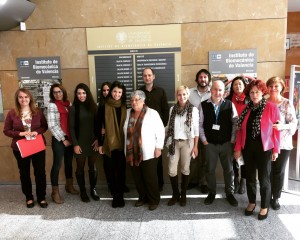
If you would like more details on the project please contact Ben on bhicks@bournemouth.ac.uk.
Business Consultancy Pop-up store was a great success!
Business Consultancy pop-up store was a 1-day event, organised to aid SMEs in realising their potential and growing their businesses.
Morning sessions enabled individual attendees to have 1:1 consultancy with four academic experts:
- Dr Parisa Gilani (leadership)
- Dr Sara Hourani (dispute resolutions)
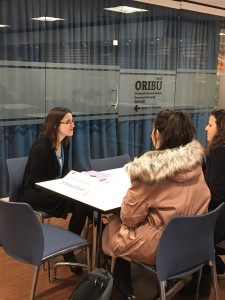
Dr Parisa Gilani consulting businesses regarding the leadership agenda of SMEs
- Dr Nasiru Taura (entrepreneurship)
- Dr Elvira Bolat (digital marketing).
Afternoon sessions included quick-fire talks for all attendees:
- Maximising the impact of leadership development for your business – Dr Parisa Gilani
- Business failure: real options for finance and running your business – Dr Nasiru Taura
- Online dispute resolution: more efficient ways for resolving customer disputes – Dr Sara Hourani
- (Re)energising your business with digital: six essential tips – Dr Elvira Bolat.
Both parts of the event were well attended by students, staff and primary local businesses, among which are Creatful, Kindred, Eat Pho Ltd. BU academic experts are now in conversation with individual SME owners to see how BU can further support these businesses in desire to grow. Most businesses are now considering to work with BU’s Student Project Bank to allow students to work on individual assignments that will greatly benefit both businesses and students.
In addition, during the event we have organised tombola. The winning number is 2 and now local Vietnamese restaurant, Eat Pho Ltd, is going to receive 1 hour 1:1 consultancy with all four academic experts.


Signature dish of Eat Pho, source: https://media-cdn.tripadvisor.com/media/photo-s/08/36/07/20/highly-recommended-our.jpg
Congratulations to Eat Pho Ltd and we are looking forward to making a difference for your truly amazing business.
We would like to thank BU Events and RKEO teams as well as BSc Marketing students (Molly Oven, Danielle Hearn, Annaik Mackel, Andrew Herschtal) for supporting the event and organising it to such high standard.
HE policy update
Last week was all about the HE Bill (which meant it was also about TEF, fees, student loans, immigration and Brexit) – and the Autumn Statement:
Student information – the QAA have announced a consultation on their draft guidance to institutions on student information following the Competition and Markets Authority guidance in 2015. It closes on 7th December.
NSS boycott: After the National Union of Students had appeared to back away from a national boycott of the NSS, saying that they would support individual unions and only call a national boycott as a “last resort”, on Wednesday they announced that they would be calling for it – as trailed in the Guardian on Tuesday– because of the link between the TEF and fees. It will be interesting to see how this plays out when the HE Bill is debated in the Lords next week.
HE and Research Bill – The Higher Education and Research Bill passed its third reading and report stage on Tuesday – read my separate blog here. The Lords second reading is on 6th December and a lively debate is expected there, probably on many of the same issues as were discussed in the Commons, although it would be good if more of the actual Bill could be discussed. As expected, in the Commons the (helpful and non-controversial) government amendments were all passed and most of the rest were not discussed – and none were passed – but the debated amendments were mostly about TEF, student loans, the impact of immigration changes and Brexit – all very interesting but not directly relevant to the Bill – and all that were pushed to a vote were dismissed. The official report of proceedings is here and the Dods summary of the debate with the key points made by the participants is attached – ignore the off-putting first page – it gets better. UUK’s note on concerns and proposed changes to the Bill was published just before – these changes will now all be dependent on lobbying in the Lords. UUK published a briefing for MPs attached to a blog on what they want to see changed.
Maintenance Grants and Loans – this is likely to remain a hot topic in the HE Bill debate, the House of Commons library published a short and interesting briefing in October on the impact of the changes. These briefings are factual and politically neutral so are a helpful reference point. It summarises how the position has changed and flags that while debt will go up, affecting students from disadvantaged backgrounds the most, actual repayments will not go up anywhere near as much, because many of the additional loans for maintenance will not be repaid (they are repaid after tuition fee loans). Of course, high earners from disadvantaged backgrounds will have to repay significantly more. It also looks at how much the change from grants to loans will affect participation and concludes that it is likely that it will.
A reminder that there are currently consultations on maintenance loans for part-time students and also on loans for PGRs – please contact policy@bournemouth.ac.uk if you want to comment on those.
And Research Professional noted that the government is still planning to sell the student loan book – starting in 2017.
Education and Social Mobility – A House of Commons briefing pack was also produced ahead of the debate on education and social mobility on Tuesday (you can read the debate on They Work for You). It summarises the recent Social Mobility Commission State of the Nation report and the position in relation to FE and schools and highlights falls in spending on further education. It provides a very useful reading list for those of you interested in this area.
International staff and students and immigration controls – On international students, there was an interesting response in the HE Bill debate from Jo Johnson that caused a ripple on twitter – after all the concern about TEF being used to limit international student numbers (thanks to Wonkhe for finding the quote on Hansard). The Minister is taking an unorthodox and refreshing approach – apart from telling everyone to calm down (just before the quote below) – he has been speaking widely about how welcome international students are and even appeared at the Times Higher Education awards last night and repeated the message.
“We have no plans to introduce any cap on the number of non-EU students who can come to the UK to study. No decisions have been made on tailoring or differentiating non-EU student migration rules on the basis of the quality of the higher education institution, or on how that might be achieved…
“We want compliance to be a strong feature of our system. It is important that the sector should do all it can to be compliant with Home Office regulations… [the Home Secretary] mentioned compliance and quality. High-quality institutions are compliant institutions; they are one and the same.”
There are stories that the consultations on immigration (on rules for employers and on international students) may not now come out until the New Year – we were expecting it/them in the next couple of weeks.
Another House of Commons briefing paper was published on the “effect of exiting the EU on higher education” last week ahead of one of the many debates on this topic which is being debated everywhere including in the HE bill debates as noted above. It doesn’t change anything but if you are trying to catch up on any of the specific issues e.g. research or students it is a very useful reference source with helpful links. Interestingly it doesn’t talk about EU staff at universities – something which is often missed because it is not a specifically HE issue – but one that is very important – although it does note a number of parliamentary questions that cover staff including the recent reassurances from Jo Johnson that staff should be able to stay as long as the EU reciprocates.
We are also awaiting the next steps in the Education Committee inquiry into Brexit – the chair tweeted how important this was but at the time of writing they hadn’t published all the evidence.
Autumn Statement – Theresa May made a speech to the CBI pre-announcing the investment in research and development in the Autumn Statement on Wednesday. UUK have published a blog on the Autumn Statement, which contained few surprises as most of the news had been trailed – and apart from letting fees (which may affect the local accommodation market for students) the only really interesting bit for universities is the £2bn investment in R&D. This is new money, but it sounds as if it will be very targeted to innovation/commercialisation projects and science in industry – so concerns remain about the risk to research funding more widely following Brexit.
Workshop: working with the press
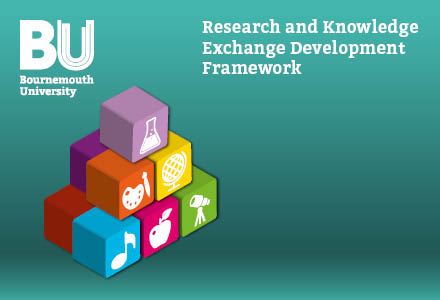
Despite the increasing popularity of online media sources, ‘traditional’ media outlets still tend to be the main way most people consume news. Working with the media can be a very powerful way of sharing your research findings with the general public or with specialist audiences. It’s a good way of disseminating your research, which can lead to impact further down the line.
As part of our new Research & Knowledge Exchange Development Framework, we will be running a session about working with the media as one way of sharing your research. This session is part of the ‘planning for impact and communicating research’ pathway.
This workshop will be led by BU’s PR manager, Nathaniel Hobby, who will take you through the basics of working with the press.
Date & time: Monday 5 December 9:30am – 11:30am
Location: Lansdowne Campus
For further information and to book, see BU’s staff intranet.
Festival of Learning 2017 – What could you do? Only few more days left to apply!
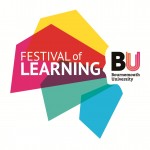 The deadline to submit your proposals for Festival of Learning 2017 is fast approaching, and we would like to remind you that you have only few more days to apply!
The deadline to submit your proposals for Festival of Learning 2017 is fast approaching, and we would like to remind you that you have only few more days to apply!
Planning your own public event can be a bit of a challenge when you try putting together an event that is interactive and lasts several hours, so how about a film screening followed by a short debate? We all love watching films…who does not like going to the cinema? Film screening is a fantastic way of showcasing your research and let’s be honest, planning it is not that complicated!
Fog of Sex: stories from the front line of student sex work
This event was a screening of an award winning docudrama that brings the real-life testimonies of students currently working within sex industry to the screen. The film was made as part of a pioneering new study called The Student Sex Work Project. The project has transformed understanding about the motivations and needs of student sex workers. The screening was followed by Q&A with criminologist Debbie Jones, who co-led the study, producer Chris Britten and clinical sexologist Sam Geuens.
You do not necessarily need to create your own film to be able to screen a film. Film screening can be an addition to your event that effectively illustrates your research by putting it into different perspective which can trigger some interesting discussion with the audience. As an example we would like to mention ‘The Shelley- Frankenstein legacy: Social science in history and today’ event which was part of ESRC Festival of Social Science 2016 at Bournemouth University. This event was in a form of a ‘question time’ style debate with a film screening that aimed to explore the feminism and sociology of the body from historical and contemporary perspectives. The film illustrated what had been discussed and helped people to gain a better understanding.
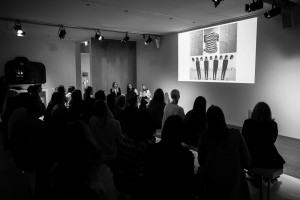
There is only one support session left so make sure to come and talk to us about your event idea
Thursday 1 December 8:30am-5pm Talbot Campus Drop In
Remember that the deadline for event submissions is 4pm on Friday 2 December
Find out more about how to apply Here.
If you have any questions about the global Festival of Learning, please contact the Global Engagement Hub: 01202 965112 globalbu@bournemouth.ac.uk
If you have any questions about the UK Festival of Learning, or difficulties using the online application form, please contact the Festival of Learning Team: 01202 961342 FoL@bournemouth.ac.uk
Winner of “The strength of young graduates contest”.
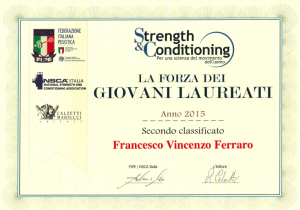
Last Friday a postman knocked at my parent’s house in Italy.
He carried a parchment, from The National Strength and Condition Association.
On it is written that my Master Degree Thesis won “The strength of young graduates contest” as second best Italian research in its field.
The study of 2015, is titled: “THE BIOMECHANICS EVALUATION IN STUDYING THE MOTION – COGNITION RELATIONSHIP” and can be summarised as follow:
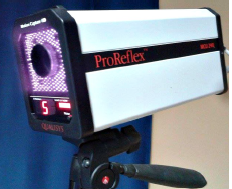 using a system of 8 QTM cameras and a force plate, I measured the effect of different tasks upon the static balance in 20 young volunteers.
using a system of 8 QTM cameras and a force plate, I measured the effect of different tasks upon the static balance in 20 young volunteers.
To do so, I asked them to perform four tasks in a randomised order, while I was recording their centre of pressure (with force plate) and centre of mass (with 3D motion capture system).
Tasks were:
- Open Eyes (OE). The participants were instructed to hold a steady position, standing up with their feet together, for 30s.

- Closed Eyes (CE). Same position as OE, but participants were instructed to keep their eyes closed for 30s.
- Cognitive Dual Task (COGN-DT). Holding the same steady position, I asked them to countdown aloud, backwards in threes from a number that I randomly chose.
- Motor Dual Task (MOT-DT). Same position, but for this task volunteers were instructed to move their fingers (of the right hand) and touch their thumb alternately, for 30s.
What the result told us was that the COGN-DT was causing more perturbation, followed by the CE task.
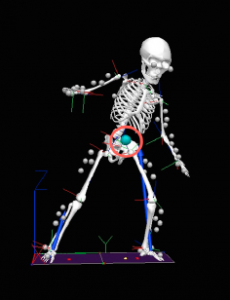 Special thanks go to the people who helped me at the MotionLab in Naples (Giuseppe Sorrentino, Laura Mandolesi and Pasquale Varriale), and to my current supervisors (Alison McConnell, Tom Wainwright and James Gavin) who believed in me by giving me the opportunity to be here today.
Special thanks go to the people who helped me at the MotionLab in Naples (Giuseppe Sorrentino, Laura Mandolesi and Pasquale Varriale), and to my current supervisors (Alison McConnell, Tom Wainwright and James Gavin) who believed in me by giving me the opportunity to be here today.
Looking forward, with hope to collect more milestones.
Thanks.
Engaging London-based Diplomats in BU’s Research on Soft Power and Public Diplomacy
On 23rd November 2016, the Polish embassy in London hosted a public engagement event supported by the Corporate and Marketing Communication (CMC) Academic Group and the Centre for Politics and Media Research at the Faculty of Media and Communication. The event aimed at the dissemination of research insights produced by the Centre and by the CMC among London-based diplomats and public diplomats provided a professional platform to discuss emerging trends in the practice of public diplomacy.
Following publication of ‘Nation branding, public relations and soft power: corporatising Poland’ by one of the Centre’s fellows, Dr 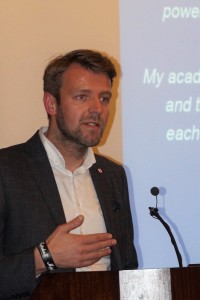 Paweł Surowiec, his study provided a background for the discussion of tensions between conceptualizations and practice of nation branding as well as for the discussion of contentious issues in relationships between democracy, public diplomacy, branding and the governance of soft power resources.
Paweł Surowiec, his study provided a background for the discussion of tensions between conceptualizations and practice of nation branding as well as for the discussion of contentious issues in relationships between democracy, public diplomacy, branding and the governance of soft power resources.
The event was opened by the Ambassador of the Republic of Poland to the United Kingdom, His Excellence, Mr. Arkady Rzegocki. It followed by remarks from Jaqueline Curthoys of Routledge and Dr Darren Lilleker, the head of 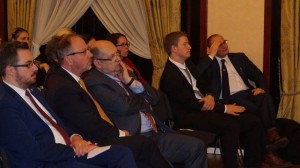 the Centre for Media and Politics, talks by Dr Paweł Surowiec of Bournemouth University and Dr Keith Dinnie of Middesex University as well as the Q&A session with the both panelists. The event was mainly attended by academics analysing diplomacy and statecraft, London-based public diplomats (from, among others, German, Slovakian, Polish, Indonesian, Ethiopian, Canadian embassies and cultural diplomacy institutes) as well as by the Faculty’s fellows and students reading for their degrees on BA (Hons) Politics and MA International Political Communication.
the Centre for Media and Politics, talks by Dr Paweł Surowiec of Bournemouth University and Dr Keith Dinnie of Middesex University as well as the Q&A session with the both panelists. The event was mainly attended by academics analysing diplomacy and statecraft, London-based public diplomats (from, among others, German, Slovakian, Polish, Indonesian, Ethiopian, Canadian embassies and cultural diplomacy institutes) as well as by the Faculty’s fellows and students reading for their degrees on BA (Hons) Politics and MA International Political Communication.
Inaugural lecture: how supermarket scanner data reveals the secrets of the checkout – next week
 Most of us shop for food in supermarkets on a regular basis, but do we give enough thought to the data gathered about our shopping habits? Barcode scanners can provide supermarkets with a wealth of information about consumer behaviour and food pricing.Professor Tim Lloyd joined Bournemouth University in 2015 and is an expert in agriculture and food pricing. His current research includes looking at the use of supermarket scanner data and the factors that lead to food price inflation within Europe. His interest in food economics stemmed from his undergraduate studies when the focus was on food mountains deriving from European subsidies, offset by starvation in Africa as highlighted by Band Aid.
Most of us shop for food in supermarkets on a regular basis, but do we give enough thought to the data gathered about our shopping habits? Barcode scanners can provide supermarkets with a wealth of information about consumer behaviour and food pricing.Professor Tim Lloyd joined Bournemouth University in 2015 and is an expert in agriculture and food pricing. His current research includes looking at the use of supermarket scanner data and the factors that lead to food price inflation within Europe. His interest in food economics stemmed from his undergraduate studies when the focus was on food mountains deriving from European subsidies, offset by starvation in Africa as highlighted by Band Aid.
Fast forward to the present day, and the issues facing us now are quite different. The prevalence of fast food and processed foods mean that people are at risk of both over-nutrition and malnutrition, while our high streets are dominated by multinationals with a keen interest in data about their consumers.
Professor Lloyd’s lecture will share insights from his research into supermarket pricing, focusing on the widespread use of price promotions in modern food retailing. It may just change how you shop.
Bournemouth University’s inaugural lecture series aims to celebrate new professorial appointments and the depth and breadth of research produced by the university. For further information on the inaugural lecture series, please visit www.bournemouth.ac.uk/public-lecture-series
About the event
To book your free ticket, click here.
Venue: Executive Business Centre, Holdenhurst Road.
Date: Monday 5 December.
Time: 6:30pm for a 7pm lecture start.
Refreshments will be provided at the event.
For more information about the event, please contact Rachel Bowen at rbowen@bournemouth.ac.uk.
Festival of Learning 2017 – What could you do? Apply before Friday 2nd December!
Do you have a fantastic piece of research that you’d like to develop into a public engagement event? You still have one more week to apply for Festival of Learning 2017!
What you research often determines how you will engage with the public and who your work will impact; nevertheless people love to learn about what you do and appreciate short demonstrations.
Getting drunk with 302 brain cells – what we learn from a worm?
Prof Lindy Holden-Dye from Southampton University studies the brain of a simple nematode worm, which has just 302 brain cells, to learn how alcohol affects the human nervous system. In October she gave a talk to Café Scientifique’s audience in which she talked about her research but also showed the equipment she used in a lab. Prof Lindsy Holden-Dye also talked about her relations with the worms and event brought few with her to show them to the audience.We have appreciated short demonstrations on how to handle nematode worms as well as the process of getting them drunk.

Make sure to come to one of our drop-in support sessions to talk to us about your event idea!
There are only two sessions left:
Monday 28 November 9am-11am, Executive Business Centre Cafe
and
Thursday 1 December 8:30am-5pmTalbot Campus
Remember that the deadline for event submissions is 4pm on Friday 2 December
Once you are ready to submit your event proposal you will need to complete the online application form. Applications for both the global Festival of Learning and the UK Festival of Learning will be handled via one form. The form can be saved and edited up until the point you submit. To help make the process as easy as possible we have also provided a planning document that includes a list of questions and requested response lengths.
Find out more, download the planning document and take a look at dates for our drop-in sessions.
If you have any questions about the global Festival of Learning, please contact the Global Engagement Hub: 01202 965112 globalbu@bournemouth.ac.uk
If you have any questions about the UK Festival of Learning, or difficulties using the online application form, please contact the Festival of Learning Team: 01202 961342 FoL@bournemouth.ac.uk
CFP: Special Issue on Gender and Mobility in Tourism
Call for Papers: Tourism Review
Special Issue on Gender and Mobility in Tourism
Guest Editors:
Jaeyeon Choe, PhD
Centre for Events, Leisure, Society & Culture, Faculty of Management
Bournemouth University, UK
Cristopher Livecchi, PhD
Department of Geography
State University of New York, USA
Gender in/and tourism have been gaining an increasing attention from tourism scholars since the 1990s (e.g., Aitchison, 2005; Figueroa-Domecq et al., 2015; Ferguson, 2011; Ireland, 1993; Pritchard & Morgan, 2000; Munar et al., 2015; Swain, 1995). Despite growing interest and published works, the nexus of tourism and gender has not been thoroughly explored by researchers. Gender and tourism literature is fragmented, with a lack of communication and collaboration across disciplines even though there are overlapping topic areas and discussions. There has not been enough interdisciplinary research work carried out, leading to fragmented literature reviews, theorization processes and methods. Thus, the primary aim of this special issue is to thoroughly review the theories, theorization processes and methods/methodology of gender studies in tourism, by encouraging the incorporation of LGBT, queer studies and ‘White’ feminism concepts and theories.
Secondly, we are interested in exploring how migration and mobility in a globalising world have affected gender issues in relation to tourism, and implications of practices, politics and meanings of mobility for women (Porter, 2011). Migration theory had begun to include feminist theory in the early 1990s (Chant ,1992), and has provided insights into the connections and the mutually constitutive relationship between the construction of masculinities and masculinist ideologies; and migration, (im)mobilities and transnationalism and gender issues. As scholars interested in migration and mobilities work collaboratively and transnationally across different worlds (Yeoh & Ramdas, 2014), papers that address how migration and gender issues influence tourism research and practices are welcome. We also welcome papers that incorporate action research, as well as papers that develop future research directions.
In summary, this special issue, we seek papers related to issues about (im)mobilities, migration, LGBTQ, ‘White’ feminism, action research, social sustainability and the cultural geography of gender and tourism. We invite contributions from a variety of disciplines including anthropology, geography, sociology, psychology, cultural studies, leisure studies, tourism studies and education. We invite you to submit papers on topics that include (but are not limited to):
– Migration and gender (in)equality
– Gender politics, migration and (im)mobilities
– Action research in gender and tourism
– Research methods development
– LGBT/queer studies in tourism field
– ‘White’ feminism/ ‘White’ masculinity
– Cultural geography of gender and tourism
– Social sustainability and gender issues
– Gender and the Sharing Economy
– “Dangerous women” in tourism
– Implications of practices, politics and meanings of mobility for women
– Gender, migration and (im)moralities in developing worlds
– Brexit and its potential impact on immigrant women communities
Each article should be approximately 3000-5500 words long.
Submission Deadlines:
· 500 words abstract due: 20 December 2016
· Full paper due: 20 February 2017
Please send your abstracts/papers to Jaeyeon Choe, PhD (jchoe@bournemouth.ac.uk)
Festival of Learning 2017 – What could you do?
 The call for proposals for Festival of Learning 2017 is still open and you have only a week to apply!
The call for proposals for Festival of Learning 2017 is still open and you have only a week to apply!
There are many benefits of taking part, as the festival is an excellent opportunity to showcase your research and gain valuable feedback from members of the public. It is also an effective tool for developing your engagement skills and according to NCCPE these skills can be useful in other areas of your career for example, the capacity to build and sustain effective partnerships, adapting communications styles for different audiences and reflecting and learning from your experience.
If you are still searching for some inspiration for Festival of Learning 2017, below you can find our previous blog posts with some suggestions for engaging events:
The Great British Brain Off
Moonbrella
Making Science Graphic
The forefront of gene therapy,Antarctic ice shelves and The secret life of animals
Film screening
Getting drunk with 302 brain cells – what we learn from a worm?
Make sure to come to one of our drop-in support sessions to talk to us about your event idea!
There are only two more left:
Monday 28 November 9am-11am, Executive Business Centre Cafe
Thursday 1 December 8:30am-5pm Talbot Campus
Remember that the deadline for event submissions is 4pm on Friday 2 December











 BU paper among top 20 most cited papers
BU paper among top 20 most cited papers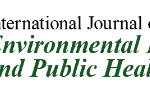 Nepal migrant workers returning from India
Nepal migrant workers returning from India New BU midwifery publication
New BU midwifery publication MSCA Postdoctoral Fellowships 2025 Call
MSCA Postdoctoral Fellowships 2025 Call ERC Advanced Grant 2025 Webinar
ERC Advanced Grant 2025 Webinar Horizon Europe Work Programme 2025 Published
Horizon Europe Work Programme 2025 Published Horizon Europe 2025 Work Programme pre-Published
Horizon Europe 2025 Work Programme pre-Published Update on UKRO services
Update on UKRO services European research project exploring use of ‘virtual twins’ to better manage metabolic associated fatty liver disease
European research project exploring use of ‘virtual twins’ to better manage metabolic associated fatty liver disease